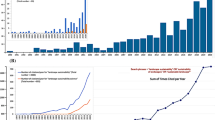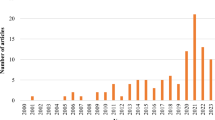
Overview
Highlights how humans value nature, the opportunities and challenges in changing socio-ecological systems
Provides insights into concepts and methods to study human-nature relationships, designed for a broad audience
Focus on integrative approaches exploring interactions across different scales, intensity levels and landscapes
This book is open access, which means that you have free and unlimited access
Buy print copy
Tax calculation will be finalised at checkout
About this book
This edited volume aims to widen the discussion about the diversity of human-nature relationships and valuation methods and to stimulate new perspective that are needed to build a more sustainable future, especially in face of ongoing socio-environmental changes. Conceptual and empirical approaches, including qualitative, quantitative, and mixed methodologies have been used to highlight the importance of an integrative understanding of socio-ecological systems, where healthy ecosystems underpin the quality of life and societal activities largely drive environmental changes.
Readers will obtain a comprehensive overview of the many and diverse ways the relationships between people and nature can be characterized. This includes understanding how people assign values to nature, discuss how human-nature interactions are shaped and provide examples of how these values and interactions can be systematically assessed across different land systems in Europe and beyond.
This open access book is produced by internationally recognized scientists in the field but written in an accessible format to be of interest to a large audience, including prospective students, lecturers, young professionals and scientists embarking to the interdisciplinary field of socio-ecological research and environmental valuation.
Similar content being viewed by others
Keywords
Table of contents (32 chapters)
-
Front Matter
-
Conceptualizing Human-Nature Interactions
-
Front Matter
-
-
Mountain Systems
-
Front Matter
-
Editors and Affiliations
About the editors
Daniel Depellegrin is currently senior researcher at the Institute of Aquatic Ecology (Ocean and Human Health Chair) of the University of Girona (Spain) and former research fellow at the University of Exeter (Renewable Energy Group, United Kingdom). His line of research spins around marine socio-ecological studies, decision support science for Maritime Spatial Planning and Ocean Multi-Use. He is author of over thirty scientific publications in the field of decision support instruments for Maritime Spatial Planning, cumulative effect assessment, marine ecosystem services assessment and artificial intelligence based geospatial modelling. Daniel has worked in various international Project Clusters in the Baltic Sea, Mediterranean and Atlantic Sea Region, among others H2020, NATO – Science for Peace & Security Programme and ERDF-INTERREG.
Lukas Egarter Vigl is a senior researcher at Institute for Alpine Environment at Eurac Research (Italy) and a lecturer in Environmental Geomatics at the University of Innsbruck (Austria). In his research Lukas explores why and how landscapes in mountains change in response to changes in management and climate, and what this means for human wellbeing and society at large. He answers these questions mainly using tools and concepts from ecology, geography, and agronomy, operating at multiple scales that range from the plot to the landscape level. Over the past 10 years, Lukas has been involved in a variety of international EU-funded projects at the human-nature interface, among other the AlpES-project (on Alpine Ecosystem Services mapping), the LUIGI-project (on Green Infrastructure and ecological connectivity) and the REBECKA-project (on climate change and land suitability). Currently, he is leading a research group that aims at better understanding the complex interactions between people and nature and at developing practical solutions to better manage our environment.
Bibliographic Information
Book Title: Human-Nature Interactions
Book Subtitle: Exploring Nature’s Values Across Landscapes
Editors: Ieva Misiune, Daniel Depellegrin, Lukas Egarter Vigl
DOI: https://doi.org/10.1007/978-3-031-01980-7
Publisher: Springer Cham
eBook Packages: Biomedical and Life Sciences, Biomedical and Life Sciences (R0)
Copyright Information: The Editor(s) (if applicable) and The Author(s) 2022
License: CC BY
Hardcover ISBN: 978-3-031-01979-1Published: 01 July 2022
Softcover ISBN: 978-3-031-01982-1Published: 01 July 2022
eBook ISBN: 978-3-031-01980-7Published: 30 June 2022
Edition Number: 1
Number of Pages: XVIII, 438
Number of Illustrations: 1 b/w illustrations
Topics: Ecosystems, Biodiversity, Urban Geography / Urbanism (inc. megacities, cities, towns), Environmental Management



